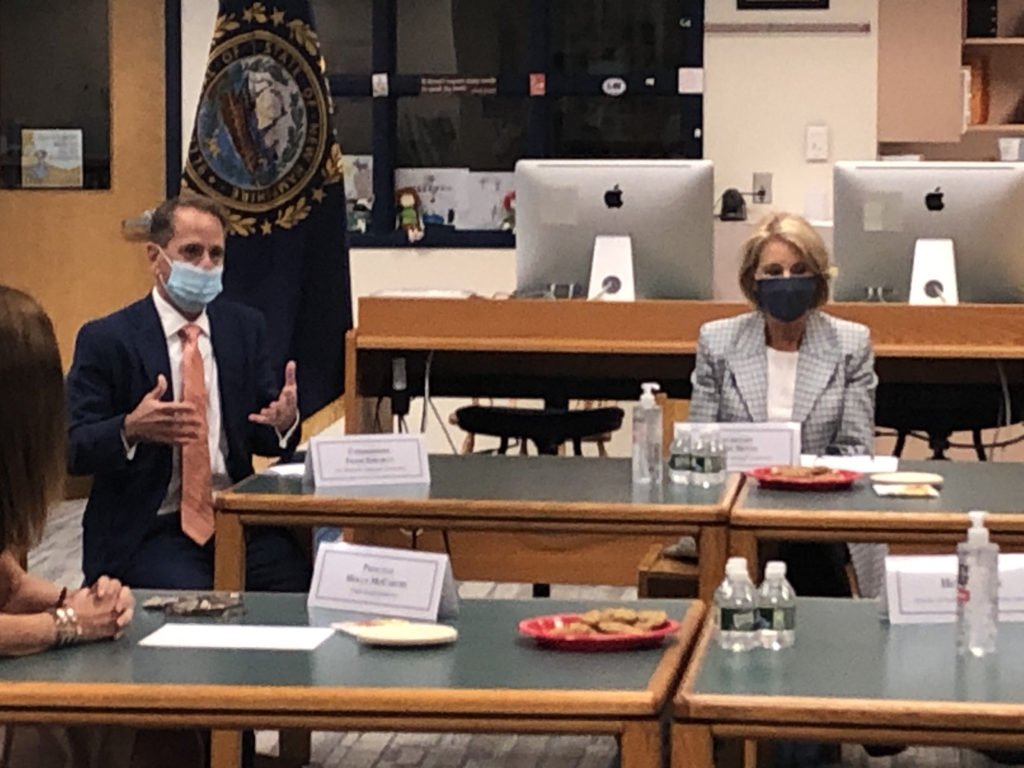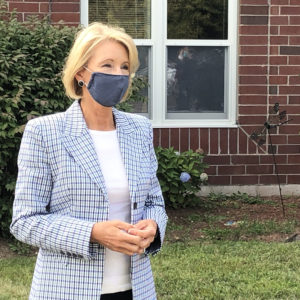U.S. Secretary of Education Betsy DeVos told NHJournal she didn’t know of any state other than New Hampshire that had rejected federal public education funding for charter schools, a decision that appears even more problematic as Granite State parents look for education options amid the COVID-19 crisis.
Last December, the Democratic-controlled New Hampshire Fiscal Committee voted to reject $46 million in federal funding to help create more public charter schools and provide parents with educational options in the state’s public school system. Senate Majority Leader Dan Feltes, now the Democratic nominee for governor, supported the decision to reject this funding.
New Hampshire Commissioner of Education Frank Edelblut has brought the request back to the committee every month, and every month they’ve rejected it — even as the COVID-19 pandemic has created more demand for educational options among working parents juggling jobs and children forced into remote learning at home by their local schools.
Edelblut joined Secretary DeVos for a roundtable at Riddle Brook Elementary School in Bedford, N.H. “to learn more about the Bedford school district’s localized approach to safely reopening schools and how it’s providing both in-person and distance learning options for students,” according to a statement from the Department of Education. DeVos met with parents, teachers and administrators for about an hour, discussing how the school was able to re-open for classroom instruction despite the challenges of the pandemic.

NH Commissioner of Education Frank Edelblut and U.S. Education Secretary Betsy DeVos discuss COVID-19 education challenges during a roundtable at Riddle Brook Elementary School in Bedford, N.H.
After the roundtable, DeVos and Edelblut were asked about the Fiscal Committee’s rejection of federal education funds.
“We are disappointed that the Fiscal Committee once again voted against accepting public charter school funding into the state of New Hampshire,” Edelblut said. “We will continue to fight for that funding because we know it’s in the best interest of our students and our children here in the state.”
“We want to support the development of public charter schools in any state that wants the funds,” DeVos added. “We know there’s a lot of demand for them across the country.”
Asked if she knew of any state that had rejected these federal funds other than New Hampshire, DeVos told NHJournal, “I don’t believe so.”
There has been a surge of interest in educational options as many New Hampshire public schools have made the decision to only offer part-time in-school education — the so-called “hybrid” model — or have gone entirely to remote learning. Research shows that remote learning has been ineffective, particularly for younger students.
On Thursday, the Diocese of Manchester announced 487 new students had enrolled in the diocesan Catholic schools over the summer, with another 190 students on waiting lists.
“We are thrilled that we were able, through the Transfer Incentive Program and full return to the classroom, to welcome almost 500 new students into the beauty and excellence of Catholic education. This is a testament to what so many New Hampshire families are looking for,” Alison L. Mueller, Director of Marketing, Enrollment, and Development for Catholic schools said in a statement.
The same is true for the Exeter-based Virtual Learning Academy Charter School (VLACS), where demand has surged. Despite hiring more than 70 new teachers, VLACS reports thousands of students remain on the waitlist. Gov. Chris Sununu announced $7 million in additional CARES Act funding for VLACS earlier this month due to increased demand.
“One of the reasons New Hampshire did so well in our switch to remote instruction this spring was because of the experience we had with VLACS,” Sununu said. “As we return to school, VLACS is helping us provide education to every child in New Hampshire, whether it’s in class, a hybrid model, or remotely.”
New Hampshire Democrats continue to insist that funding for public charter schools is a detriment to traditional public schools, as though charter schools are somehow illegitimate. In fact, charter schools tend to outperform traditional public schools when the socio-economic factors are accounted for, a Harvard study shows.
Opposing public charter schools is a shift for Democrats. In 2016, then-governor Maggie Hassan sent a letter to the Department of Education urging support for a charter school grant very similar to the one her fellow Democrats now reject.
“I am writing in support of the New Hampshire Department of Education’s application for the U.S. Department of Education’s, Charter School Programs Grant for State Educational Agencies,” Hassan wrote. “Charter schools create an opportunity to provide access to an educational experience that students may not have otherwise.”
Why does would-be governor Sen. Dan Feltes oppose free federal dollars that could create options for low-income working families during the pandemic? He did not respond to repeated requests for comment.
DeVos was also scheduled to visit McKelvie Intermediate School, but that stop was canceled when a faculty member tested positive for COVID 19 Friday morning.





